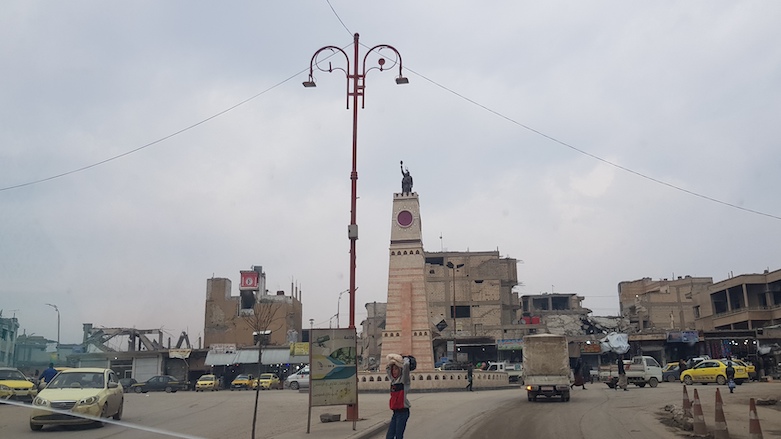In Raqqa, the Syrian government remains unwelcome
“The people of Raqqa, in general, reject the return of the Syrian government.”

RAQQA (Kurdistan 24) – The former Islamic State stronghold of Raqqa has suffered immensely during the Syrian civil war. In October, Syrian government forces arrived in Raqqa’s countryside and other towns bordering Turkish-backed forces to prevent Turkey from expanding its control over areas in the northeast. But officials in Raqqa say they are not welcome in the city.
“The people of Raqqa, in general, reject the return of the Syrian government,” Mouhammad Nour al-Dib, the co-chair of the Raqqa Civilian Council, told Kurdistan 24.
“The people of Raqqa support each other in their daily lives. They rather have the Autonomous Administration in the city, especially since the region made 11,000 sacrifices, they do not accept the idea of having the Syrian government return to Raqqa,” Nour al-Dib added.

In December, Syria’s national security chief, Ali Mamlouk, met Arab tribal leaders in Qamishlo, calling on them to defect from the Syrian Democratic Forces (SDF). The move appeared to show that Damascus is still reluctant to accept the special status of the SDF and the Autonomous Self-Administration in Raqqa despite talks between Damascus and the administration to find a solution.
“This is a problem that blocks any solution to the Syrian crisis, and that is the Syrian government’s reluctance to change its mentality,” Nour al-Dib explained.
“I can ask where were Ali Mamlouk and Bashar al-Assad when Raqqa was being liberated from the Islamic State? What did they offer to support that process? We are a part of Syria, and we are Syrians, but what did they offer to us and our city?”

Abdulsalam Hemsork, co-chair of the Social Affairs of the Raqqa Civilian Council, said the Syrian government withdrew from Raqqa in 2013. “After that, many Islamist factions ruled over Raqqa and carried out oppression against the people – first Ahrar Al-Sham and then ISIS.”



In October 2017, the SDF liberated the town from the Islamic State with support from the US-led coalition. After that, the people were busy with their lives and there was no pressure, the official said.
“I’ve never experienced a freer Raqqa than in the last two months: seeing people go about their lives, expressing their allegiances comfortably,” Marwan Hisham, a freelance Raqqa journalist who returned to his hometown after being in exile for four years, wrote for Amnesty International in October.
“The religious, the anti-Assad, the pro-Assad, and even the anti-SDF” all express themselves openly.
But the people are afraid that this free environment will disappear if the Syrian government returns.
“The people are frustrated with the recent developments, they are rightly concerned and they do not feel secure because they fear the Syrian government and Russia will enter their areas and Turkey will continue with its occupation,” Hemsork said.

Farhan Al-Askar (Abu Wael), a Raqqa Military Council commander, suspects that the Syrian government sleeper cells carry out “simple activities like sound explosions” in Raqqa since regime sleeper cells do not carry out car bombs like the Islamic State.
In December, there were claims the Russians entered Raqqa city and provided humanitarian aid, but local officials say the Syrian army and Russians did not enter the city but only the countryside of Raqqa.
“We do not accept the Syrian government’s return to the cities of Raqqa and Tabqah,” Al-Askar said. “We would have no problem with the [entry of] Russian forces if they were to communicate with the SDF in Raqqa—but we do not trust the Syrian government; we cannot allow them in and then later they start to prosecute the people.”


Nevertheless, the Raqqa Military Council said it is ready to coordinate on the matter of front lines and checkpoints, “but a full control of Raqqa by the Syrian government will not be accepted.”
“The people demand a return of security instead of receiving food baskets from the Russians. In Tabqah, they [Russians] visited the Assadiye area, but they were not welcome by the people.”
The official said the people of Raqqa would not accept the return of “Syrian government institutions,” especially after the “crimes” the regime committed, notably the disappearance of locals from Raqqa who had visited Syrian government areas.
However, he said the situation would change if international powers guaranteed an SDF-Damascus deal.
“Most of them in Raqqa, Tabqah, and Deir al-Zor are wanted by the Syrian government; therefore, any return of Damascus to our areas, without an agreement which is guaranteed internationally, will not be accepted,” Al-Askar stated.
“If the Syrian government also changes its mentality and behavior, and the head of state changes, the people might allow them in, politically and militarily.”
Editing by Karzan Sulaivany